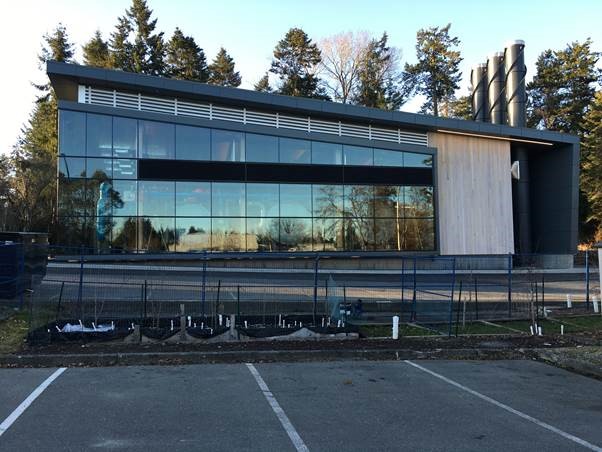Energy and climate

As one of the cleanest energy jurisdictions in western North America, 98% of British Columbia’s electricity is generated from clean or renewable sources. BC Hydro delivers 95% of the province’s power and 100% of UVic’s electricity through hydroelectric resources. Additionally, BC Hydro is striving to become the first jurisdiction in western North America to establish a 100% clean electricity standard.
UVic has been carbon neutral since 2010, and tracks its greenhouse gas (GHG) emissions, which are categorized as:
- Buildings
- Scope 1 emissions: Natural gas, diesel, heating oil
- Scope 2 emissions: Electricity (hydro-electricity)
- Fleet Vehicles
- Scope 1 emissions: Mobile combustion of gasoline, propane, diesel
- Paper Supplies
- Scope 3 emissions
In 2023, UVic’s offsettable emissions totaled 10,302 tonnes of CO₂ equivalent (tCO₂e)—a 14% decrease from 2022 and a 34% reduction compared to the 2010 baseline.
As of the 2022/2023 reporting year, over 53% of UVic's on-campus energy came from low-carbon sources.
UVic remains accountable for delivering on the ambitious goals outlined in its Climate and Sustainability Action Plan 2030 (CSAP), including a commitment to completing a detailed carbon decarbonization strategy that will guide the university towards Net Zero emissions by 2040 and a climate-positive campus by 2050. This strategy is currently under development and will soon be published as a critical document supporting UVic’s sustainability efforts. Reinforcing this commitment, UVic’s President has signed on to the Race to Zero—a global initiative demonstrating the university’s dedication to tangible, measurable climate action.
UVic continues to lead by implementing advanced building design standards, such as LEED Gold, Passive House, and the Canada Green Building Council’s Zero Carbon Building (ZCB) Standard for new construction. In 2023, the university completed two new buildings: Čeqʷəŋín ʔéʔləŋ (Cheko’nien House) and Sŋéqə ʔéʔləŋ (Sngequ House). UVic is also launching a comprehensive fleet strategy aimed at documenting and scaling efforts toward full fleet electrification. Additionally, efforts to electrify the District Energy Plant are advancing, marking a critical step in the university's efforts to meet its GHG reduction targets.
Climate and Sustainability Action Plan 2030
- Goal 1: Achieve a 50% reduction in GHG emissions from campus operations by 2030 (relative to 2010), with the target of Net Zero by 2040 and a climate-positive campus by 2050.
Learn more about our energy and carbon strategies below.
Climate Change Accountability Report
The BC Provincial Climate Change Accountability Act's Climate Change Accountability Report (CCAR) is an annual report submitted by all provincial public sector organizations. The CCAR reporting provides a record of each organizations' GHG emissions, offset purchases, and reduction plans and actions. In 2020, the CCAR name was changed from Carbon Neutral Action Report (CNAR).
Since 2010, UVic has reduced is required offset purchases by reducing our annual GHG emissions.
Learn more about our CCAR/CNARs here.
Energy management
The Energy and Water Management team in Facilities Management is responsible for:
- Management of utilities on campus including electricity, natural gas, fuel, and water
- Monitoring and data analysis of energy, water consumption, and greenhouse gas emissions
- Identification, assessment, and implementation of opportunities to reduce energy and water consumption
- Identification and assessment of cost-effective, low-carbon alternative energy opportunities that are compatible with campus energy infrastructure
- Collaboration with the Office of Campus Planning & Sustainability to promote an energy and resource conservation culture in the university community
- Research of new technologies to improve building and campus energy efficiency
- Greenhouse gas reporting as per the Climate Change Accountability Act
Since 2011, UVic has participated in the BC Hydro Energy manager program, which collaborates with energy managers across BC to implement energy conservation and greenhouse gas reduction programs such as CleanBC. Through this group, energy managers are able to build consensus on technical and financial topics related to energy systems, and educate provincial and municipal governments how to develop effective policies and programs to that enable more efficient use of energy and reduction of greenhouse gas emissions in the commercial and industrial sectors.
Since the inception of the energy management team UVic has participated in the BC Hydro Continuous Optimization program as the major strategy to drive energy efficiency at UVic. Through this program engineering studies are conducted at the building level which identify energy saving projects that an institution can choose to peruse. Although implementation plans vary, energy efficiency is the primary goal and has resulted in significant energy savings since 2010.
UVic continues to work with BC Hydro and Fortis BC to acquire incentives that help improve the business case for energy efficiency at UVic.
Energy Wise network
UVic is a member of the Energy Wise Network, a collaborative program run by BC Hydro and FortisBC. The program provides funding to run energy reduction campaigns.
Learn more about the current Energy Wise Campaign here.
Revolving Sustainability Loan Fund
The Revolving Sustainability Loan Fund (RSLF) provides $250,000 to fund Energy and Water conservation projects on campus that provide a return on investment. The loans are paid back with the savings from utility or operating costs. Through loan repayments, the fund is able to reinvest the capital to fund additional sustainability projects on campus.
Learn more about the fund here.
Plans
In 2011, UVic published the Integrated Energy Masterplan. The plan identifies key future opportunities to reduce energy consumption and greenhouse gas emissions.
In 2019, UVic began planning the Carbon Reduction Plan to establish long-term reduction targets for building GHG emissions and a technical pathway to achieve those targets.
